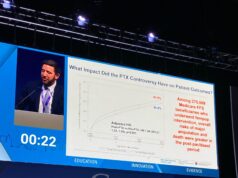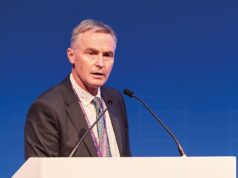
Yasuaki Arai, director of the National Cancer Center Hospital, Tokyo, Japan, and current president of the Japanese Society of Interventional Radiology (JSIR), delivered the Honorary Lecture at the European Conference of Interventional Oncology (ECIO) in Nice, France, yesterday. He spoke on the topic “Beyond the evidence—the true goal of interventional oncology” and received a standing ovation for his presentation.
Quoting William Osler, a Canadian scientist who said that medicine is a science of uncertainty and the art of probability, Arai noted that therapeutic decision was based on probability. “We cannot forsee the future. The only way that we can choose the most suitable treatment is to choose it based on probability, as determined from scientific data. Therefore, clinical decisions should be made based on the probability.
Evidence-based medicine is the global paradigm in medicine. In the evidence-based medicine world, a treatment established by evidence is the standard and we provide the standard treatment for patients. Evidence from clinical trials inform clinical practice, therefore evidence changes the world. However, “Interventional oncologists must look beyond the evidence to think of all the possible interventional oncology solutions that can be offered to patients. While we have to respect the evidence, we should rise to the challenge of offering better treatment for patients using our knowledge, technique and ideas. We must standardise interventional oncology procedures and use standard endpoints in oncology.”
Arai outlined situations, particularly such as the ones encountered with patients who have advanced disease where there is no treatment pathway based on the current evidence. He said that in these situations, interventional oncologists had an important role to play.
“Sometimes oncologists who are committed to the evidence, say to advanced cancer patients, ‘there is no recommended treated for you’. Medical oncologists often use a ‘same disease, same drug, same dose and same administration’ schedule. We are not medical oncologists, we are interventional oncologists and our tools are not drugs, but techniques, devices, knowledge and a spirit that responds to a challenge. [Thereby being able to tailor solutions to individual patient needs],” Arai said.
Showing a series of cases where interventional oncology treatments had resulted in positive outcomes for patients, he noted that: “There is no evidence for some of these treatments, yet taking on a challenge led to a successful results for patients. Evidence is important. However, we should know that it is not perfect and not enough to care for our patients. While respecting the evidence, we should endeavour to create better treatments for patients using interventional oncology with our knowledge, techniques and ideas. We should move beyond the evidence,” he said.
Arai also made the point that interventional oncology can help bring down the costs of cancer treatments. “Cost reduction is the most important global issue of medicine,” he reminded delegates.
Then, using the example of bland embolization with handmade particles, Arai said, “This technique can be provided in any economical situation. [Often] Better treatment is not that which is special and available just for a small number of rich patients, but one that can be used for a wide number of patients. Developing new treatmenst is important, but developing available treatments and optimising them so that they are available for more patients is more precious,” he concluded.













